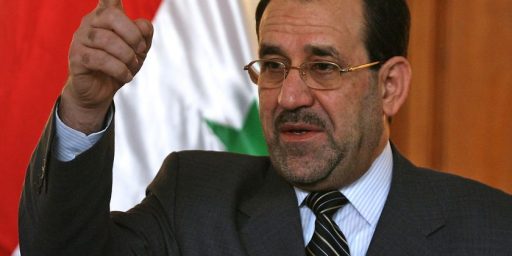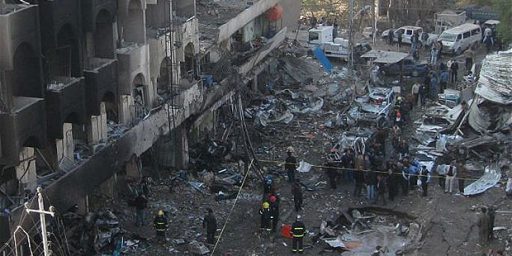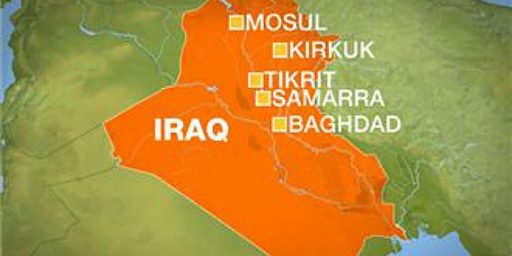Maliki Wants Equipment and Autonomy
Iraqi Prime Minister Nouri al-Maliki has finally cracked down on the Shiite militias and claims that his government will be ready for much much more autonomy if the United States simply provides adequate materiel support. “If we succeed in implementing the agreement between us to speed up the equipping and providing weapons to our military forces, I think that within three to six months our need for American troops will dramatically go down. That is on condition that there are real, strong efforts to support our military forces and equipping and arming them.” For its part, “The US Government is wary of handing over large amounts of military hardware to the Iraqis because it has sometimes ended up in the hands of militias and insurgents.”
Maliki is angry at criticism from the American government.
Robert Gates, the new US Defence Secretary, said that Mr al-Maliki could lose his job if he failed to stop communal bloodshed and Condoleezza Rice, the Secretary of State, gave a warning that he was living on “borrowed time” and that American patience was running out. Challenged on the point, Mr al-Maliki remarked acidly: “Certain officials are going through a crisis. Secretary Rice is expressing her own point of view if she thinks that the Government is on borrowed time, whether it is borrowed time for the Iraqi Government or American Administration. I don’t think we are on borrowed time.”
He added: “I wish that we could receive strong messages of support from the US so we don’t give some boost to the terrorists and make them feel that they might have achieved success. I believe that such statements give moral boosts to the terrorists and push them towards making an extra effort and making them believe that they have defeated the American Administration, but I can tell you that they haven’t defeated the Iraqi Government.”
He rejected the accusation that his Government was “lenient” with Shia militias, saying 400 al-Mahdi Army members had been arrested in recent days, in crackdowns in southern towns such as Karbala, Samawa, Diwaniya and al-Nasiriya. And he insisted that he was prepared to fulfil his promises to Washington and confront the militias of Shia parties within his coalition, including Moqtada al-Sadr’s widely feared al-Mahdi Army. He conceded that some “sectarian” acts were being perpetrated. But he said there would not be a civil war because Sunni and Shia had lived in peace for many years.
Not lately, unfortunately. (The “morale boosts to the terrorists” line is classic, as that argument has been used ad nauseam by the Bush administration and many of its supporters.)
WaPo’s Josh Partlow notes that this fiestiness marks a major attitude adjustment:
His comments amounted to a defense of the viability of his government, which he pledged to lead “until I achieve the peace and prosperity that Iraq deserves.”
In an interview Dec. 24, Maliki sounded less committed to his office. “I wish I could be done with it before the end” of his four-year term, he told the Wall Street Journal. “I would like to serve my people from outside the circle of senior officials, maybe through parliament.”
Sabrina Tabernise provides some encouragement that Maliki is finally getting tough, citing an announcement he has “moved against the country’s most powerful Shiite militia, arresting several dozen senior members in the past few weeks.”
Although the announcement seemed timed to deflect growing scrutiny by an American administration that has grown increasingly frustrated with Mr. Maliki, American officers here offered some support for the government’s claims, saying that at least half a dozen senior militia leaders had been taken into custody in recent weeks.
In perhaps the most surprising development, the Americans said, none of the members had been prematurely released, a chronic problem as this government has frequently shielded Shiite fighters. “There was definitely a change in attitudes,” in the past three to four weeks, a senior American military officer said, speaking on condition of anonymity.
While U.S. officials are understandably suspicious that this is a short-term show to bolster support, there are signs that it is actually working.
In Shiite neighborhoods across the capital, militia members seem to have dropped from view in recent weeks, residents and militia members say. Shiite foot soldiers have tucked away their machine guns and have melted back into bustling city blocks, preparing for what they say they believe will be an American military onslaught against them.
Then again:
It was not immediately clear whether the vanishing act was related to fear over the arrests or was a calculated move to wait out the coming American troop increase and prepare to re-emerge later. But Iraqi and American officials acknowledge that the militia is the central challenge in the new effort to stop the cycle of violence in the capital, especially given the fighters’ ability to move and hide freely in tightly knit Shiite neighborhoods.
It is a vast task ahead: American military intelligence officials have estimated that there are around 7,000 Mahdi militiamen in Baghdad. Many have split off into their own fiefs. “They are like amoebas,” one Shiite politician said. “Always dividing and multiplying.”
Further, it’s not the majority Shia who are the main problem:
For now, it is Sunni violence that shatters neighborhood calm and draws the Shiites out, perpetuating the war. A bombing at a largely Shiite university on Tuesday that killed about 70 has already prompted Mahdi militia members to reinstate some checkpoints in eastern Baghdad, residents said. A drive-by shooting on the same day in the upscale Shiite neighborhood of Binouk that killed 12 has set revenge reactions into motion.
Given the recent spate of bombings, it has been hard to notice any drop in violence. Still, while caution is more than warranted at this time, I’m surprised to see this show of backbone by al-Maliki. It is a most welcome development.






I don’t know, James, but I see this as the repetition of a complaint that the Iraqi military has been making for some time now: that they don’t have tanks or jets. Darned handy for use against Americans or for turning the current incipient civil war into the fullblown kind.
What the Iraqi military needs more than anything else is probably non-coms and that’s something we can’t give them.